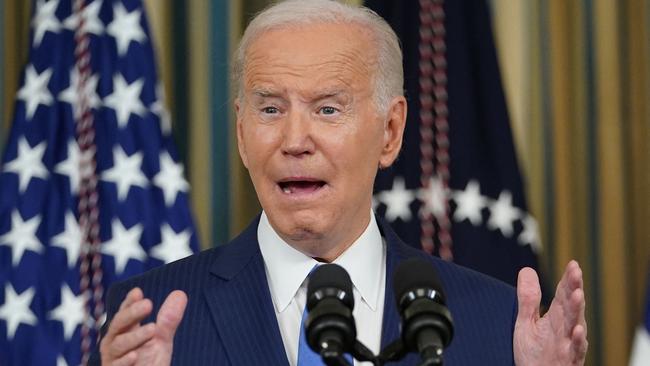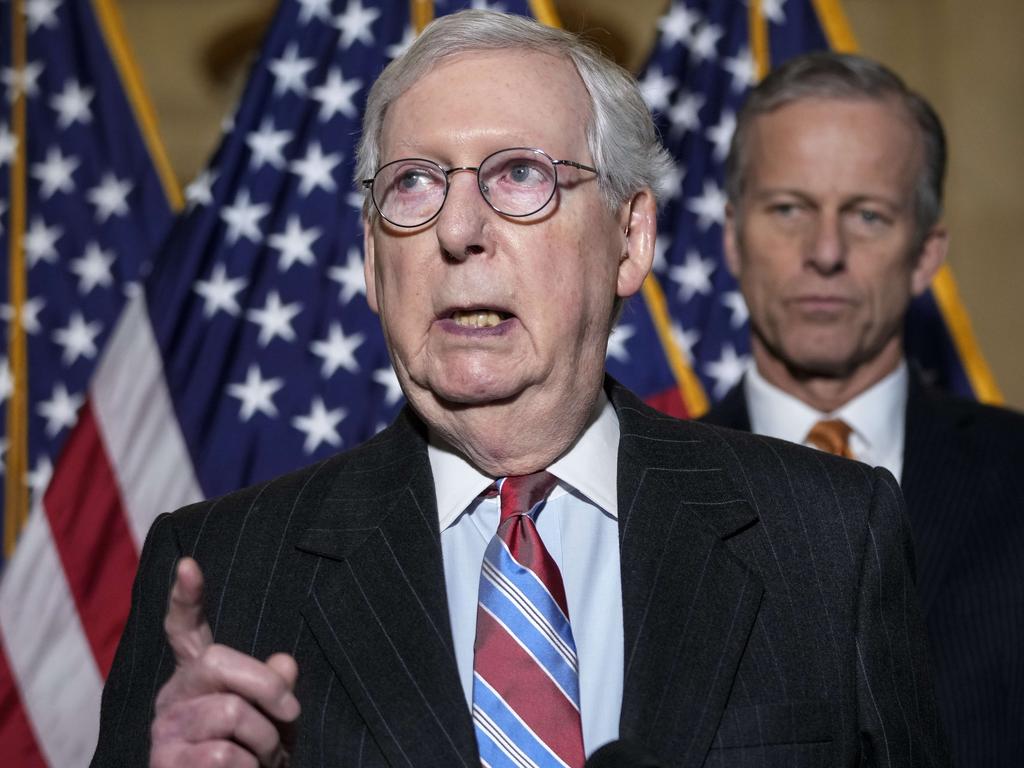The high price of the Trump effect
Republicans’ lacklustre performance in the midterm elections, despite the best political and economic backdrops, will sharpen and expose divisions in a party living under the shadow of Donald Trump.

But Republicans’ lacklustre performance in Tuesday’s midterm elections, despite the best political and economic backdrops realistically imaginable, will sharpen and expose divisions in a party living under the shadow of Donald Trump at the very time its best political weapon against Democrats – high inflation – is starting to dissipate.
Yet it’s hard to see this week’s result as a repudiation of Trump by the typical American voter, however successful his presidency is judged, and the former president appears unlikely to want to enjoy a quiet retirement.
According to most national polls, about three-quarters of Americans, a historically high level, believed the US was going in the wrong direction leading up to the election.
But as of Thursday night (Friday AEDT) Republicans looked set to win a small majority of between six and 10 seats in the 435-seat lower house chamber.
In the Senate, the most likely scenario, as The Australian went to print, was that Democrats would maintain their control in a chamber split 50-50, with Vice-President Kamala Harris able to use her casting vote as president of the Senate to break any tie.
That’s far short of what history might have expected: between 1918 and 2016 the president’s party lost an average of 29 seats in the house and four seats in the Senate during a first-time administration.
“We lost fewer seats than any Democrat president in a mid-terms in 40 years, and it was the best mid-terms for a government since 1986,” President Joe Biden, written off by many in his own party before the vote, understandably crowed on Wednesday.
The red wave was a trickle, if that. The polls and the betting markets were wrong.
Trump’s supporters have tried to pin the blame on the party’s congressional leadership: Mitch McConnell and the potential Republican Speaker Kevin McCarthy. But few Americans would even know who they are.
The party went to the election with no signature legislative policy. By contrast, Trump, one of the most famous men in the world, hosted 30 rallies across 17 states in the past 18 months with the national media in tow, most in the lead to this week’s election.
Biden made a huge fuss about Trump’s endorsements, especially the most controversial ones who lost or haven’t had an outright win: television celebrity doctor Mehmet Oz in Pennsylvania and former college football star Hershel Walker in Georgia, two states the GOP needed to win.
Walker still has a chance at making the Senate after Georgia Secretary of State Brad Raffensperger confirmed this week that the race will go to a run-off on December 6. Neither candidate got the 50 per cent required under the state’s laws.
Because it was such as safe seat, no one bothered to poll the Colorado congressional district of Lauren Boebert, a young Republican often pictured with a gun, but she may yet lose her district, with counting going down to the wire.
Young venture capitalist Blake Masters in Arizona appeared set to lose, and Don Bolduc lost in New Hampshire, both owing their candidacies to Trump
Former TV anchor Kari Lake, despite obvious political skills, whatever you might think of her politics, did far worse than expected. She was, not unreasonably, seen as a standard-bearer for Trump who held rallies for her at least twice in the state.
The party’s most immediate problem is whether Trump decides to announce his 2024 presidential campaign next week, having signalled strongly and repeatedly that he would.
It would seem to be a little tone-deaf given the party’s performance, and the final midterm results may not even be known by then.
His pointed public criticism of Ron DeSantis – who won a thumping victory in the Florida gubernatorial contest – as “Ron DeSanctimonious” and a threat to spill dirt on the 44-year-old governor should he announce his own presidential bid, have divided the party into two powerful camps.

And it’s about to get nasty. Late on Thursday Trump issued a statement calling DeSantis an “average governor with great public relations” who had succeeded only thanks to Trump.
Parts of the conservative media have turned on Trump, including the New York Post, which portrayed Trump unflatteringly as “Trumpty Dumpty” in a front-page picture on Thursday. The Wall Street Journal, often seen as the voice of establishment Republicans, carried several columns hammering the former president’s role in the campaign.
Dealing with Trump’s influence isn’t the Republicans’ only problem that has been made worse by Tuesday’s unexpected photo finish. The party went to the election with no concrete policy ideas, as opposed to vague promises to fix things: the border, inflation, crime, schools, some of which are not in the congress’s power to fix anyway. It was notably quiet about spending, taxation and foreign policy, for instance – areas in which congress has real power.
Republicans with a majority in the lower house will be expected to propose bills and policies, even if they inevitably stall in any Democrat-controlled Senate.
A small, potentially single-digit majority in the House of Representatives also will mean political headaches for whoever emerges as GOP Speaker, most likely McCarthy, 57, from California.
A small majority means individual members have leverage, especially small groups of them.
The Freedom Caucus, led by congressman Jim Jordan, who easily won his seat, is a group of libertarian-inclined candidates who will demand promises from whoever wins any Republican speakership. Others will insist on national abortion reform, along the lines of a national 15-week threshold after which the procedure becomes illegal, before they support any Speaker.
Truman Capote once wrote that “more tears are shed over answered prayers than unanswered ones”. The US Supreme Court finally overturned Roe v Wade in June, costing the Republican Party swaths of votes in the election, and a GOP majority in at least one of the chambers will prompt Republicans to propose bills placing limits on abortion nationwide, ensuring the issue won’t be going away, as some centrists in the party might prefer.

On the off-chance the GOP does ultimately take the Senate, which may not be known until the December 6 Georgia run-off, they will have even have the ability to send abortion bills to the White House, daring the President to defy congress’s will by not signing them.
Obviously, Republicans have advanced from their earlier position. The Biden administration will no longer be able to legislate anything without Republicans’ agreement.
The GOP will have the power to shut down the highly politicised January 6 committee, and have the power to investigate anyone and anything it wants, including Hunter Biden, the President’s son, and certainly Anthony Fauci, the outgoing chief medical adviser to the President.
It’s going to be two years of political fireworks, for sure.
Democrats lost a lot of seats in New York, where eight lower house seats flipped including that of Democrat campaign chairman Sean Patrick Maloney.
But less than two weeks from his 80th birthday, a relaxed Biden understandably appeared vindicated on Wednesday, declaring his administration would change nothing on its agenda. “They are just finding out what we’re doing,” he said.
And he strongly hinted he was more likely now to run for president again in 2024, regardless of polls that showed around three-quarters of Americans didn’t want him to.
“Watch me,” Biden said, adding he would relish watching a “fun” battle between Trump and DeSantis for the GOP nomination.
Some of the moderate Democrat hopefuls for president, such as senator Amy Klobuchar or Colorado governor Jared Polis, privately may have hoped for a worse showing to force Biden’s hand.

Inflation, which has been at 40-year highs for more than six months, has been the GOP’s best political weapon, but it may soon start to decline. Figures released on Thursday (Friday AEDT) showed the monthly core rate of inflation, which trips out volatile food and energy items, halving to 0.3 per cent, sending the stockmarket soaring almost 5 per cent in a day.
The economy may yet fall into a recession, which always helps the opposition candidate in any election. But the US economy has shown itself to by far more resilient than most people have projected given the rapid increase in interest rates. The jobless rate was 3.7 per cent last month, near the lowest level since the 1960s.
It’s too early to see the end of high inflation, but a declining rate and a soaring stockmarket are a perfectly realistic scenario leading up to the next election – not ideal for whoever is on the Republican ticket.
The midterms revealed ongoing problems with the parts of the US electoral system, too.
One silver lining for Republicans: so far, none of its losing candidates has disputed their loss. The “election denier” accusation, however fair in particular cases, is one of the Democrats’ most powerful tools.
Even so, that’s not to say the US electoral system doesn’t need reform. One voter in Ann Arbor, Michigan, didn’t cast her ballot until after 2am, after waiting in a queue for six hours, according to one report.
That is takes Arizona and Nevada potentially a week to count critical Senate races, is almost comically inept. Such delays inevitably invite speculation of corruption. Sensible Republicans however, should hope their candidates don’t link their losses to these shortcomings.







Democrat House of Representatives Speaker Nancy Pelosi branded it a Pyrrhic victory, as she would of course.